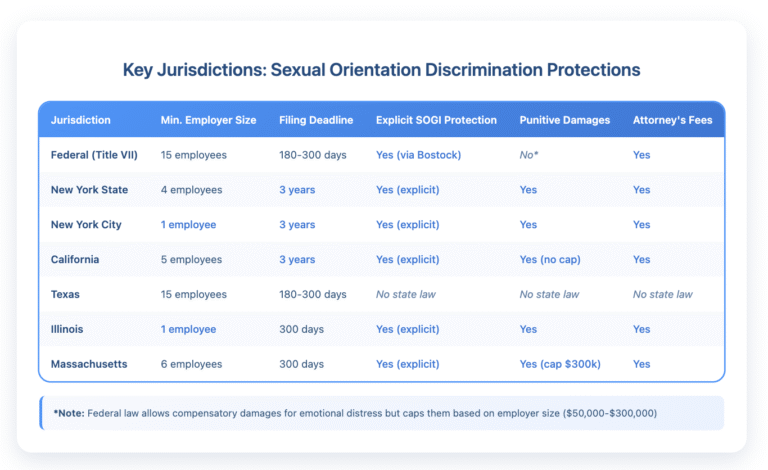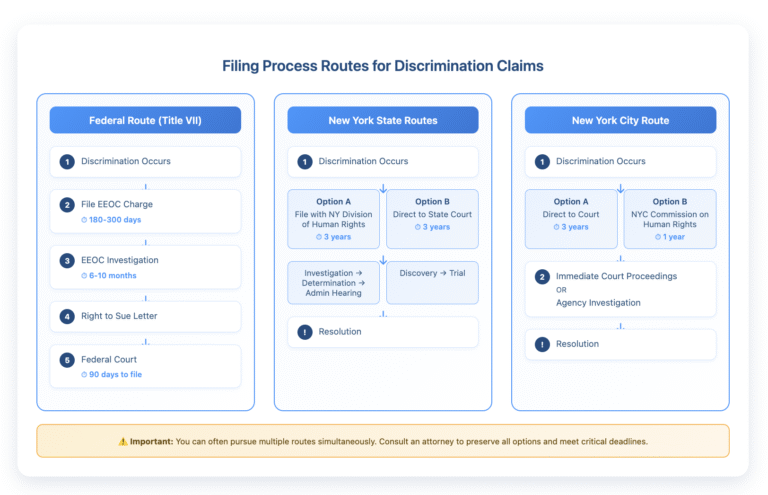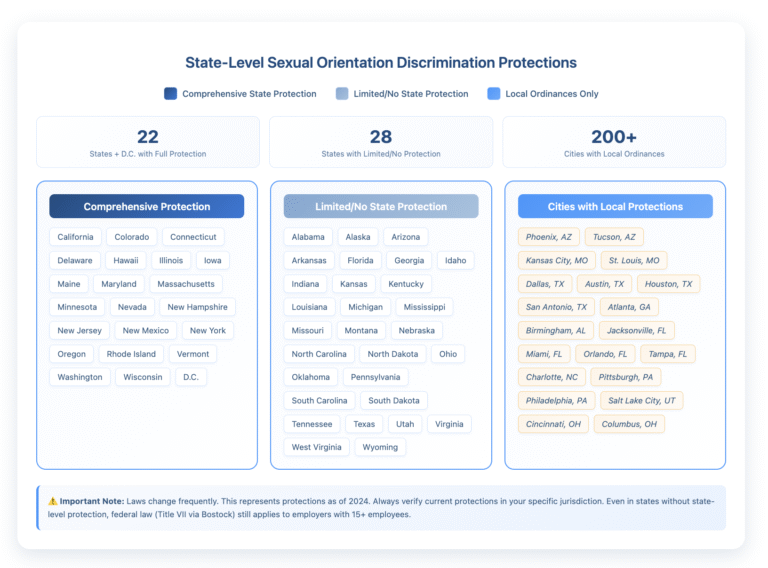While the Supreme Court’s Bostock decision provides nationwide protection against sexual orientation discrimination, your strongest legal remedies might actually come from state or local laws. These laws often provide broader coverage, longer filing deadlines, and better damages than federal law. Let’s break down what you need to know to maximize your legal options.
If you’re in New York, California, or one of the other states with comprehensive LGBTQ+ protections, you have significantly more tools to fight discrimination than someone relying solely on federal law. Understanding these differences could mean the difference between a successful claim and a missed opportunity.
Disclaimer: This article provides general information for informational purposes only and should not be considered a substitute for legal advice. It is essential to consult with an experienced employment lawyer at our law firm to discuss the specific facts of your case and understand your legal rights and options. This information does not create an attorney-client relationship.
Why State and Local Laws Matter After Bostock
Federal law sets the floor, not the ceiling, for workplace protections. Title VII covers employers with 15 or more employees and gives you 180-300 days to file with the EEOC. But that’s just the beginning of your potential rights.
State and local laws frequently provide protections that federal law doesn’t. They cover smaller employers, provide longer filing windows, allow for greater damages, and often include explicit protections that go beyond what federal courts have recognized.
The Coverage Gap Federal Law Leaves
Title VII’s 15-employee threshold leaves millions of workers unprotected at smaller businesses. But in New York, the State Human Rights Law covers employers with as few as four employees. New York City’s law goes even further – covering all employers regardless of size, even those with just one employee.
This matters enormously for workers at small companies, startups, or local businesses. That discriminatory treatment you’re facing at a 10-person company? Federal law can’t help, but state or local law probably can.

*Note: Federal law allows compensatory damages for emotional distress, but caps them based on employer size
Understanding Explicit vs. Interpreted Protections
Twenty-two states plus D.C. explicitly prohibit sexual orientation discrimination in their statutes. These states didn’t wait for courts to interpret “sex” discrimination to include LGBTQ+ workers – they wrote it directly into their laws.
This explicit protection matters for several reasons. First, it removes any ambiguity about coverage. Second, it often comes with specific provisions addressing LGBTQ+ workplace issues. Third, it typically reflects a broader commitment to enforcement and cultural change.
States With Explicit Protection
States like New York, California, Illinois, and Massachusetts specifically list “sexual orientation” and often “gender identity” as protected characteristics. The New York State Human Rights Law, for example, defines sexual orientation as “heterosexuality, homosexuality, bisexuality or asexuality, whether actual or perceived.”
This specificity eliminates arguments about whether particular conduct is covered. When the law explicitly protects sexual orientation, employers can’t argue that discrimination against bisexual employees, for instance, somehow falls outside the statute’s scope.
Procedural Advantages of State and Local Laws
Beyond broader coverage, state and local laws often provide significant procedural benefits that make them more worker-friendly than federal law.
Extended Filing Deadlines
The EEOC’s 180-day deadline (or 300 days in states with fair employment agencies) can catch workers off guard. By the time you’ve documented discrimination, tried internal remedies, and consulted an attorney, precious time has elapsed.
Compare this to New York’s three-year statute of limitations for state law claims. This extended timeline allows you to gather evidence, explore options, and make strategic decisions without racing against an artificial clock.
Direct Court Access
Under federal law, you must file with the EEOC and receive a right-to-sue letter before going to court. This process can take months or even years, during which evidence grows stale and witnesses scatter.
Many state and local laws allow direct court filing. In New York City, you can file a lawsuit immediately without any administrative exhaustion requirement. This direct access can be crucial when you need immediate relief or when a delay would cause irreparable harm.

Damages and Remedies: Where State Law Shines
Federal Title VII caps compensatory and punitive damages based on employer size. For employers with 15-100 employees, the cap is just $50,000. Even for the largest employers (500+ employees), the cap is $300,000.
State and local laws often provide uncapped damages or much higher limits. California, for instance, has no cap on compensatory or punitive damages for discrimination claims under the Fair Employment and Housing Act (FEHA).
Beyond Money: Injunctive Relief
State and local laws sometimes provide broader injunctive relief – court orders requiring specific actions. New York City’s Human Rights Law, for example, allows courts to order extensive training, policy changes, and monitoring that might not be available under federal law.
These remedies can transform workplace culture, benefiting not just you but future employees who won’t face the same discrimination.
Strategic Considerations for Choosing Your Forum
With multiple legal options available, choosing where to file becomes a strategic decision. Consider these factors:
Employer size: If your employer has fewer than 15 employees, state or local law may be your only option.
Timing: Have you missed the EEOC deadline but are still within state law limitations? The choice is made for you.
Damages sought: If your emotional distress damages exceed federal caps, the state court might offer better recovery.
Speed: Need quick action? Direct state court filing avoids EEOC delays.
Precedent: Some jurisdictions have more favorable case law on LGBTQ+ issues.
Local Ordinances: The Hidden Protection Layer
Don’t overlook city and county ordinances. Many municipalities have their own human rights laws with unique features. New York City’s law, for instance, requires employers to use employees’ preferred pronouns and allows claims for discrimination based on “caregiver status.”
San Francisco’s ordinance provides up to 12 weeks of paid family leave – far exceeding state or federal requirements. These local laws can provide unexpected leverage in discrimination cases.
Finding Your Local Protections
Check your city or county’s human rights commission website. Many major cities – including Philadelphia, Seattle, Miami, and Atlanta – have robust local ordinances. Even in states without state-level protection, cities like Kansas City, Missouri, and Phoenix, Arizona, prohibit sexual orientation discrimination.

Note: Laws change frequently. Verify current protections in your jurisdiction.
Intersection with Other Protected Classes
State and local laws often recognize intersectional discrimination more readily than federal law. If you’re facing discrimination based on both sexual orientation and race, for example, state law might better capture the full scope of your experience.
The New York City Human Rights Law explicitly recognizes intersectional discrimination. This means you don’t have to parse out whether you were discriminated against for being gay or being Black – the law recognizes that it could be both, creating a unique form of discrimination.
Practical Steps to Maximize Your Protection
Understanding your rights is just the first step. Here’s how to position yourself for the strongest possible claim:
Document Under All Applicable Laws
When documenting discrimination, note how it violates federal, state, and local law. Use the specific language from each statute. If your state law prohibits “sexual orientation” discrimination explicitly, use that phrase in your complaints.
Preserve All Forums
Don’t inadvertently waive rights by choosing one forum too early. Some administrative filings can preclude later court action. Understand the election of remedies rules in your jurisdiction.
Consider Parallel Proceedings
Sometimes you can pursue federal and state claims simultaneously. File with the EEOC to preserve federal rights while pursuing state court action. An experienced attorney can navigate these parallel tracks without creating conflicts.
Common Pitfalls to Avoid
Workers often make strategic errors that limit their options:
Assuming federal law is enough: Even after Bostock, federal law has significant limitations. Always investigate state and local options.
Missing shorter administrative deadlines: Some local agencies have shorter filing deadlines than their state counterparts. New York City’s Commission on Human Rights has a one-year filing deadline, shorter than the state’s three years.
Choosing the wrong venue: Filing in federal court might seem prestigious, buta state court could offer better law, judges more familiar with discrimination cases, and potentially more sympathetic juries.
Not preserving all claims: Your sexual orientation discrimination might also involve disability discrimination (if you’re HIV-positive) or national origin discrimination. Ensure all potential claims are preserved.
The Enforcement Landscape
State and local agencies often provide more robust enforcement than the understaffed EEOC. The New York City Commission on Human Rights, for example, can initiate its own investigations and has attorneys who prosecute cases on behalf of complainants.
Some jurisdictions also provide free legal representation. California’s Department of Fair Employment and Housing will represent complainants at no cost in certain cases. This levels the playing field when facing well-funded employer legal teams.
Take Action to Protect Your Rights
State and local sexual orientation discrimination laws provide powerful tools beyond federal protection. But these enhanced protections mean nothing if you don’t use them strategically. The differences in coverage, deadlines, and damages can dramatically affect your case’s outcome.
Don’t navigate this complex legal landscape alone. The interplay between federal, state, and local law requires careful analysis of your specific situation. Missing a deadline or choosing the wrong forum can forever bar your strongest claims.
The attorneys at Nisar Law Group understand both New York’s expansive protections and the federal framework. We can evaluate which laws provide your strongest claims, ensure all deadlines are met, and develop a strategic approach to maximize your potential recovery.
Contact Nisar Law Group today for a consultation about your sexual orientation discrimination case. We’ll analyze all applicable laws – federal, state, and local – and chart the best path forward for your unique situation.
Time limits apply to all discrimination claims, and some are shorter than you might expect. Reach out now to protect your rights and explore all available legal options. Your sexual orientation should never limit your career opportunities, and with the right legal strategy, it won’t.


